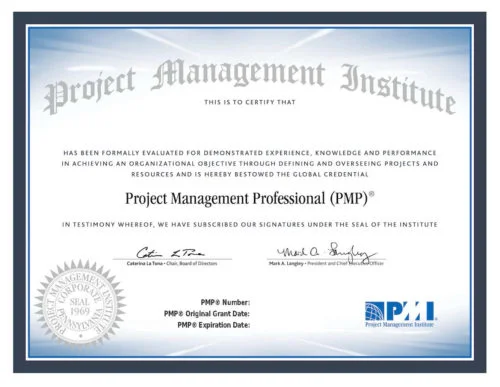What are PMP and CAPM?
The PMP (Project Management Professional) and CAPM (Certified Associate in Project Management) are the most widely accepted, internationally recognised individual project management qualifications. These certifications, created by the Project Management Institute (PMI), certify that certified project managers have the methodological, professional knowledge and competencies necessary to successfully manage projects. By the end of 2017, the number of certified project managers worldwide had reached 800,000.

Who should get the certification?
The PMP qualification is recommended for all project managers who work as full-time project managers or who want to give their career a boost in the future. CAPM training is recommended for project managers and project coordinators with less experience and can be a good basis for becoming a "black belt" project manager. Whatever the qualification, the iterative methodology developed and continuously updated by PMI can provide a strong methodological support for practical work.
What is the added value of PMP and CAPM certifications?
PMI project management qualifications are in the interests of both employees and employers, as follows:
- an internationally recognised certification demonstrating project management skills,
- in many cases, certification is an advantage, or even a requirement, to boost your career,
- the qualification positions the project manager highly and is therefore valuable to the employer,
- surveys show that salaries can be 10-15% higher,
- the knowledge behind the qualification provides a set of tools and frameworks that can be applied in daily work.
What do I need to do to get certified?
To obtain the qualification, you must meet certain prerequisites and pass an exam. The prerequisites for PMP are 4,500 hours of project management experience and 35 hours of structured project management training, while for CAPM it is 23 hours of project management training or 1,500 hours of project experience.
If the above prerequisites are met, you will be required to pass the exam after completing the application and paying the exam fee (PMP- USD 555, CAPM- USD 300). The examinations are notoriously difficult as they not only test lexical knowledge but also the best reactions and responses to given situations. The PMP exam requires 200 test questions in 4 hours, while the CAPM exam requires 150 questions in 3 hours. In both cases the exam is in English. The exam is graded using an internal weighting system, so there is no need to achieve a specific score in each case. In our experience, it is not sufficient to know the theory to pass the exam, but requires a deep understanding of the context and a solid exam routine.

Which course should I choose to meet the prerequisites?
Contrary to popular belief, the training can be replaced by any kind of project management training, without the need for a PMI R.E.P. (Registered Education Provider) trainer. The R.E.P. status is not a qualification or accreditation, it is a seal of approval, obtained by paying an annual fee, to support the marketing activities of international training companies. Contrary to popular belief, in the case of R.E.P. companies, PMI does not check the quality or professional content of the training material, but whether the organisation complies with the restrictions on PMI intellectual property.
A good solution could be an exam preparation programme, which, in addition to the number of hours, could also significantly reduce the time needed for individual preparation.
In our opinion, the most important thing is to have this programme delivered by a professional who is PMI certified and has exam experience. It is also an advantage if the lecturer is not only an instructor but also an active practitioner of project management, without experience the theory will be difficult to apply in practice.
It may also be worth checking the pass rate and references, as R.E.P. status, for example, does not guarantee the quality of these, and in most cases the high cost of R.E.P. membership fees can make these trainers up to 40-50% more expensive than other courses.
More frequently asked questions and their answers are available here.

 Designabc
Designabc